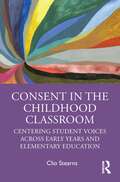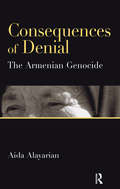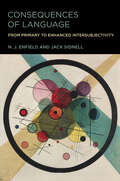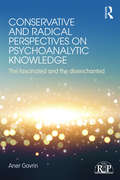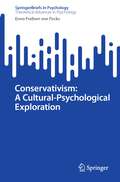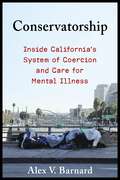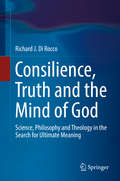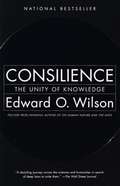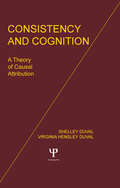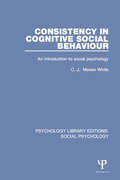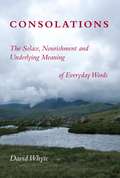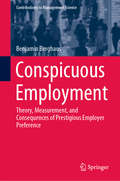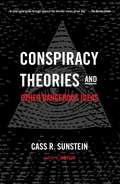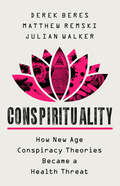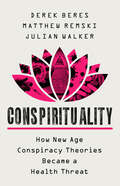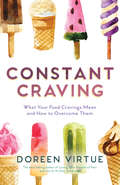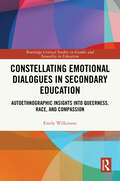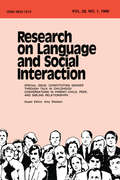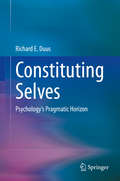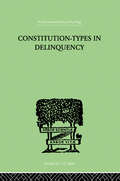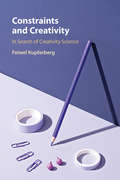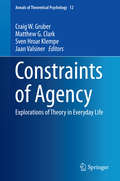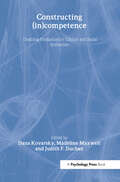- Table View
- List View
Consent in the Childhood Classroom: Centering Student Voices Across Early Years and Elementary Education
by Clio StearnsConsent in the Childhood Classroom challenges typical premises of social and emotional learning, self-regulation, and putative misbehavior by centering the theme of consent in the experiences of young children and their teachers. Early childhood and elementary teachers often face disruptions and acts of dissent from young students, without a helpful conceptual framework for understanding how these expressions may stem from social injustices, developmental nuances, and problematic assumptions about the nature of children’s agency. By posing complex yet relatable questions about the presumptions of authority, positivity, and routines in learning environments, and drawing on classroom anecdotes along with interviews with children and teachers, this book offers an accessible approach to cultivating expansive relationships in the classroom, a vision for a richer and more mutual education, and a clearer understanding of what school means from the perspective of the child.
Consequences of Denial: The Armenian Genocide
by Aida Alayarian"Consequences of Denial" seeks to provide some awareness and understanding of the horrendous tragedy of the Armenian genocide. This book illuminates the little known fact that over two million innocent Armenians died at the hands of the Ottoman Empire between 1894 and 1922; a genocide that has been, and continues to be, denied by successive Turkish governments. In this book, the author demonstrates the need not only for remembrance, but first and foremost for the acknowledgement of genocides, from government level downwards. Only by taking adequate steps at personal, group, national and international levels to acknowledge such massacres, and the trauma they create, can humankind attempt to prevent such atrocities from ever happening again. By documenting the psychological effects of the forgotten Armenian genocide and by linking these effects to crossgenerational trauma and processes of response and denial, this book aims to shed light from a psychoanalytic perspective on an insufficiently researched aspect of this genocide.
Consequences of Language: From Primary to Enhanced Intersubjectivity
by Jack Sidnell N. J. EnfieldWhat is it about humans that makes language possible, and what is it about language that makes us human?If you are reading this, you have done something that only our species has evolved to do. You have acquired a natural language. This book asks, How has this changed us? Where scholars have long wondered what it is about humans that makes language possible, N. J. Enfield and Jack Sidnell ask instead, What is it about humans that is made possible by language? In Consequences of Language their objective is to understand what modern language really is and to identify its logical and conceptual consequences for social life. Central to this undertaking is the concept of intersubjectivity, the open sharing of subjective experience. There is, Enfield and Sidnell contend, a uniquely human form of intersubjectivity, and it is essentially intertwined with language in two ways: a primary form of intersubjectivity was necessary for language to have begun evolving in our species in the first place and then language, through its defining reflexive properties, transformed the nature of our intersubjectivity. In the authors&’ analysis, social accountability—the bedrock of society—is grounded in this linguistically transformed, enhanced kind of intersubjectivity.The account of the language-mind-society connection put forward in Consequences of Language is one of unprecedented reach, suggesting new connections across disciplines centrally concerned with language—from anthropology and philosophy to sociology and cognitive science—and among those who would understand the foundational role of language in making us human.
Conservative and Radical Perspectives on Psychoanalytic Knowledge: The Fascinated and the Disenchanted (Relational Perspectives Book Series)
by Aner GovrinPsychoanalysis really should not exist today. Until a few years ago, most of the evidence suggested that its time was drawing to a close, and yet psychoanalysis demonstrated remarkable resilience in the face of criticism, alongside significant resurgence over the course of the last years. In "Conservative and Radical Perspectives on Psychoanalytic Knowledge: The Fascinated and the Disenchanted" psychoanalyst and philosopher Aner Govrin describes the mechanisms of sociology within the psychoanalytic community which have enabled it to withstand the hostility levelled at it and to flourish as an intellectual and pragmatic endeavour. He defends the most criticized aspect of psychoanalysis: the fascination of analysts with their theories. Govrin demonstrates that fascination is a common phenomenon in science and shows its role in the evolution of psychoanalysis. Govrin argues that throughout its history, psychoanalysis has successfully embraced an amalgam of what he has defined and termed "fascinated" and "troubled communities." A "fascinated community" is a group that embraces a psychoanalytic theory (such as Bion's, Klein's, Winnicott s) as one embraces truth. A "troubled community" is one that is not satisfied with the state of psychoanalytic knowledge and seeks to generate a fundamental change that does not square with existing traditions (such as new psychoanalytic schools, scientifically troubled communities and the relational approach). It is this amalgam and the continuous tension between these two groups that are responsible for psychoanalysis' rich and varied development and for its ability to adapt to a changing world. Clinical vignettes from the work of Robert Stolorow, Betty Joseph, Antonino Ferro and Michael Eigen illustrate the dynamic by which psychoanalytic knowledge is formed. "Conservative and Radical Perspectives on Psychoanalytic Knowledge" will be of interest to psychoanalysts, psychotherapists and philosophers alike.
Conservativism: A Cultural-Psychological Exploration (SpringerBriefs in Psychology)
by Enno Freiherr von FircksThe present work discusses the phenomenon of conservativism from a qualitative, cultural-psychological perspective. As such, the text breaks with current mainstream research about political ideologies wanting to assess a political culture within the simple administration of a questionnaire. The SpringerBrief will oppose such a perspective trying to assess how the conservative-minded person will structure space and time in peculiar ways. In the first part of the study, participants were invited to reflect about how they preserve or conserve meaning in various activities whereas the second part of the study tried to shed light onto how something preservable or conservable comes into being and what it actually makes it preservable. Here, an autoethnographic study revealed that something becomes meaningfully preservable when it satisfies multiple demands of the Self as well as of the environment. Readers will realize the insufficiency of the positivistic attitude analyzing conservativism from a simple quantitative perspective, and researchers are shown how political ideologies or cultures can be assessed ecologically – something that has not yet been undertaken. This leads to an appeal for scientists to study the phenomenon of conservativism more wholistically.
Conservatorship: Inside California’s System of Coercion and Care for Mental Illness
by Alex V. BarnardIs involuntary psychiatric treatment the solution to the intertwined crises of untreated mental illness, homelessness, and addiction? In recent years, politicians and advocates have sought to expand the use of conservatorships, a legal tool used to force someone deemed “gravely disabled,” or unable to meet their needs for food, clothing, or shelter as a result of mental illness, to take medication and be placed in a locked facility. At the same time, civil liberties and disability rights groups have seized on cases like that of Britney Spears to argue that conservatorships are inherently abusive.Conservatorship is an incisive and compelling portrait of the functioning—and failings—of California’s conservatorship system. Drawing on hundreds of interviews with professionals, policy makers, families, and conservatees, Alex V. Barnard takes readers to the streets where police encounter homeless people in crisis, the locked wards where people receiving treatment are confined, and the courtrooms where judges decide on conservatorship petitions. As he shows, California’s state government has abdicated authority over this system, leaving the question of who receives compassionate care and who faces coercion dependent on the financial incentives of for-profit facilities, the constraints of underresourced clinicians, and the desperate struggles of families to obtain treatment for their loved ones.This book offers a timely warning: reforms to expand conservatorship will lead to more coercion but little transformative care until government assumes accountability for ensuring the health and dignity of its most vulnerable citizens.
Consilience, Truth and the Mind of God: Science, Philosophy and Theology in the Search for Ultimate Meaning
by Richard J. Di RoccoThis book argues that God can be found within the edifice of the scientific understanding of physics, cosmology, biology and philosophy. It is a rewarding read that asks the Big Questions which humans have pondered since the dawn of the modern human mind, including: Why and how does the universe exist? From where do the laws of physics come? How did life and mind arise from inanimate matter on Earth? Science and religion have a common interest in the answers to such questions, yet many scientists and believers have been at odds for centuries. The author and contributors present a program for moving beyond the vastly different perspectives of reality offered by science and religion. Historical proofs for the existence of God are considered in light of the possibility that the universe may be only one in an eternal multiverse that contains an infinite number of other universes. Readers will find a modification of St. Augustine’s Argument from Truth for the existence of the necessary, self-sufficient being commonly referred to as God. This book is suited to all with an interest in the crossing points of science and religion, providing much food for thought and reflection. If in the end, you cannot accede to philosophy’s proofs, or theism’s invitation to faith, perhaps you will nevertheless say ‘yes’ to the amazing universe in which we live.
Consilience, Truth and the Mind of God: Science, Philosophy and Theology in the Search for Ultimate Meaning
by Richard J. Di RoccoThis book argues that God can be found within the edifice of the scientific understanding of physics, cosmology, biology and philosophy. It is a rewarding read that asks the Big Questions which humans have pondered since the dawn of the modern human mind, including: Why and how does the universe exist? From where do the laws of physics come? How did life and mind arise from inanimate matter on Earth? Science and religion have a common interest in the answers to such questions, yet many scientists and believers have been at odds for centuries. The author and contributors present a program for moving beyond the vastly different perspectives of reality offered by science and religion. Historical proofs for the existence of God are considered in light of the possibility that the universe may be only one in an eternal multiverse that contains an infinite number of other universes. Readers will find a modification of St. Augustine’s Argument from Truth for the existence of the necessary, self-sufficient being commonly referred to as God. This book is suited to all with an interest in the crossing points of science and religion, providing much food for thought and reflection. If in the end, you cannot accede to philosophy’s proofs, or theism’s invitation to faith, perhaps you will nevertheless say ‘yes’ to the amazing universe in which we live.
Consilience: The Unity of Knowledge
by Edward O. WilsonAuthor that behind disciplines as diverse as physics, biology, anthropology and the arts, lies a small number of natural laws, whose interlocking he calls consilience.
Consistency and Cognition: A Theory of Causal Attribution
by S. Duval V. H. Duval F. S. MayerFirst published in 1983. Routledge is an imprint of Taylor & Francis, an informa company.
Consistency in Cognitive Social Behaviour: An introduction to social psychology (Psychology Library Editions: Social Psychology)
by C.J. Mower WhiteSocial psychology remains unbalanced as long as we study human behaviour exclusively ‘from the outside’, leaving out of account people’s own reasons for acting as they do. Originally published in 1982, the result of the author’s emphasis on the cognitive dimension is a much more complete and well-rounded textbook of social psychology than had previously been available. Beginning with an exploration of the various models that have been suggested to explain the whole range of social behaviour, the book goes on to argue that consistency – comparability, similarity, congruity – is the principle by which social behaviour can best be explained. It goes into the cognitive processes that determine social attitudes, ascription of certain characteristics to individuals, and the attraction we feel to some people but not others. It also shows how these processes can be extended and affected by group membership. Consistency is important, the author believes, because it allows the maximum prediction of others’ behaviour and guidance of our own. These functions are demonstrated by observing failures of consistency, such as occur in humour and in negative self-esteem, and the author examines these inconsistencies in a final chapter.
Consolations: The Solace, Nourishment and Underlying Meaning of Everyday Words
by David WhyteWith the imagery of a poet and the reflection of a philosopher, David Whyte turns his attention to 52 ordinary words, each its own particular doorway into the underlying currents of human life. Beginning with Alone and closing with Work, each chapter is a meditation on meaning and context, an invitation to shift and broaden our perspectives on the inevitable vicissitudes of life: pain and joy, honesty and anger, confession and vulnerability, the experience of feeling besieged and the desire to run away from it all. Through this lens, procrastination may be a necessary ripening; hiding an act of freedom; and shyness the appropriate confusion and helplessness that accompanies the first stage of revelation. Consolations invites readers into a poetic and thoughtful consideration of words whose meaning and interpretation influence the paths we choose and the way we traverse them throughout our lives.
Conspicuous Employment: Theory, Measurement, and Consequences of Prestigious Employer Preference (Contributions to Management Science)
by Benjamin BerghausThis book illustrates the foundations of status research from the perspective of recruiting. The ever-increasing competitive pressure on both sides of the market has led to the growing significance of prestige in employment as an efficient yardstick of performance. At the same time, mounting student loans make the need for a prestigious education palpable. While prestige has always been important in the job market, continuously increasing competitive pressure is driving the role of prestige to new heights. This book shows how insights from consumer research on prestige-driven behavior can be helpful in gaining a better understanding of applicants' motives. Furthermore, it investigates the effect of prestige preference versus value-based, person-organization fit. Lastly, the book reports on experimental evidence that prestigious employer preference can provide a basis for risky decision-making behavior. Prestige is an increasingly powerful motivator in today’s job market – one that requires a closer look.
Conspiracy Theories and Other Dangerous Ideas
by Cass R. SunsteinThe nation's most-cited legal scholar who for decades has been at the forefront of applied behavioral economics, and the bestselling author of Nudge and Simpler, Cass Sunstein is one of the world's most innovative thinkers in the academy and the world of practical politics. In the years leading up to his confirmation as the administrator of the White House Office of Information and Regulatory Affairs (OIRA), Sunstein published hundreds of articles on everything from same-sex marriage to cost-benefit analysis. Conspiracy Theories and Other Dangerous Ideas is a collection of his most famous, insightful, relevant, and inflammatory pieces. Within these pages you will learn: * Why perfectly rational people sometimes believe crazy conspiracy theories * What wealthy countries should and should not do about climate change * Why governments should allow same-sex marriage, and what the "right to marry" is all about * Why animals have rights (and what that means) * Why we "misfear," meaning get scared when we should be unconcerned and are unconcerned when we should get scared * What kinds of losses make us miserable, and what kinds of losses are absolutely fine * How to find the balance between religious freedom and gender equality * And much more . . . Cass Sunstein is a unique, controversial, and exciting voice in the political world. A man who cuts through the fog of left vs. right arguments and offers logical, evidence-based, and often surprising solutions to today's most challenging questions.
Conspirituality: How New Age Conspiracy Theories Became a Health Threat
by Julian Walker Derek Beres Matthew RemskiConspirituality takes a deep dive into the troubling phenomenon of influencers who have curdled New Age spirituality and wellness with the politics of paranoia—peddling vaccine misinformation, tales of child trafficking, and wild conspiracy theories. In the early days of the COVID-19 pandemic, a disturbing social media trend emerged: a large number of yoga instructors and alt-health influencers were posting stories about a secretive global cabal bent on controlling the world&’s population with a genocidal vaccine. Instagram feeds that had been serving up green smoothie recipes and Mary Oliver poems became firehoses of Fox News links, memes from 4chan, and prophecies of global transformation. Since May 2020, Derek Beres, Matthew Remski and Julian Walker have used their Conspirituality podcast to expose countless facets of the intersection of alt-health practitioners with far-right conspiracy trolls. Now this expansive and revelatory book unpacks the follies, frauds, cons and cults that dominate the New Age and wellness spheres and betray the trust of people who seek genuine relief in this uncertain age. With analytical rigor and irreverent humor, Conspirituality offers an antidote to our times, helping readers recognize wellness grifts, engage with loved ones who've fallen under the influence, and counter lies and distortions with insight and empathy.
Conspirituality: How New Age Conspiracy Theories Became a Public Health Threat
by Julian Walker Derek Beres Matthew RemskiConspirituality takes a deep dive into the troubling phenomenon of influencers who have curdled New Age spirituality and wellness with the politics of paranoia—peddling vaccine misinformation, tales of child trafficking, and wild conspiracy theories.In the early days of the COVID-19 pandemic, a disturbing social media trend emerged: a large number of yoga instructors and alt-health influencers were posting stories about a secretive global cabal bent on controlling the world&’s population with a genocidal vaccine. Instagram feeds that had been serving up green smoothie recipes and Mary Oliver poems became firehoses of Fox News links, memes from 4chan, and prophecies of global transformation.Since May 2020, Derek Beres, Matthew Remski and Julian Walker have used their Conspirituality podcast to expose countless facets of the intersection of alt-health practitioners with far-right conspiracy trolls. Now this expansive and revelatory book unpacks the follies, frauds, cons and cults that dominate the New Age and wellness spheres and betray the trust of people who seek genuine relief in this uncertain age. Each of the three authors has witnessed firsthand the use of fear-based political agendas to manipulate the human desire for spiritual fulfillment. They throw a spotlight on the telltale signs of cult dynamics and expose how influencers have stoked suspicion of public health initiatives. And they show how charlatans and pseudo-doctors encourage their followers to oppose mainstream advice as a form of spiritual quest. With analytical rigor and flashes of irreverent humor, Conspirituality offers an antidote to our times, helping readers recognize wellness grifts, engage with loved ones who've fallen under the influence, and counter lies and distortions with insight and empathy.
Constant Craving: What Your Food Cravings Mean And How To Overcome Them (Hay House Lifestyles Ser.)
by Doreen VirtueDo you crave chocolate, bread, cheese, fries, or other foods? If so, there's a reason why, as Doreen Virtue's breakthrough book explains. Each food craving actually corresponds to a specific underlying emotion; so once you understand the meaning behind your particular craving and apply the information and affirmations within these pages, you'll be able to heal your cycle of emotional overeating. In addition, you'll read scientific studies about the mood- and energy-altering properties of each food, which will help you see how your appetite perfectly mirrors your emotions. This comprehensive and empowering guide will also show you how to give "food readings" to yourself and others, allowing you to accurately interpret the meaning behind many cravings. Constant Craving is a one-of-kind book that will give you the emotional, physical, and spiritual tools you need to make friends with food . . . and your appetite!
Constellating Emotional Dialogues in Secondary Education: Autoethnographic Insights into Queerness, Race, and Compassion (Routledge Critical Studies in Gender and Sexuality in Education)
by Emily WilkinsonThis innovative, autoethnographic study examines 12 stories of “wobble” moments—looking at “wobble” as an emotional experience—to illuminate new perspectives on LGBTQIA+ identity, school violence, racism, mental illness in students and teachers, and the emotional costs of empathy.Utilizing the author’s experiences as they navigate education’s most difficult years of practice from 2020 to 2022 and extending the existing scholarship on dialogical pedagogy and teacher identity by offering a framework that goes “beyond wobble,” it provides a new theory for how teachers can deconstruct the emotions that surround the heaviest moments of their practice, shift perspectives on situations and selves, and “see the light” of compassionate possibility in both person and practice.A sobering inquiry which provides valuable insight into the emotional landscape of a contemporary classroom embroiled in America’s culture wars and serves as a poignant exemplar of dialogical pedagogy in practice, it will appeal to scholars and post-graduate students of teacher education, educational psychology, and education policy.
Constituting Gender Through Talk in Childhood: Conversations in Parent-child, Peer, and Sibling Relationships:a Special Issue of research on Language and Social interaction
by Amy SheldonThis issue explores some of the ways in which gender, as a social construction, might be rooted in and contingent on conversational processes in childhood. The interconnections between language and gender in three key developmental sociolinguistic contexts are examined: talk between parent and child, talk among friends, and talk between siblings. When children learn to speak a language, they also learn to use it in ways that can reflect, resist, or ignore their culture's norms of acceptable feminine and masculine behavior. The authors of these articles explore the concept of talk as a medium in which both young children and the adults in their world "do" gender. This collection should act as a springboard for more thinking about ways to untangle gender and context, and to show their interconnectedness as well.
Constituting Selves: Psychology's Pragmatic Horizon
by Richard E. DuusThis book aims to provide a unique perspective and definition of the self in psychological literature, filling the gap between psychological science and practical implementation of interventions presented to psychotherapy clients. Combining insights from a broad range of interdisciplinary literature and multiple perspectives on the self and identity, the author seeks to determine whether an independent reality exists behind the term ‘self’ and what the nature of that reality might be.Among the topics discussed:Varieties of narrative self within a psychological frameFirst-personal experience and identityEthics, responsibility, and the otherSemiotics and subjectivityConstituting Selves: Psychology's Pragmatic Horizon will be of interest to clinicians and psychologists seeking to challenge preexisting conceptualizations and definitions of the self in current psychological literature.
Constitution-Types In Delinquency: PRACTICAL APPLICATIONS AND BIO-PHYSIOLOGICAL FOUNDATIONS OF (International Library Of Psychology Ser.)
by Willemse, W AFirst published in 1999. Routledge is an imprint of Taylor & Francis, an informa company.
Constraints and Creativity: In Search of Creativity Science
by Feiwel KupferbergThis book studies creativity in its own right in the search for a creativity science. If we assume that creativity can best be described by constraint theory, the complexity and paradoxes of creativity can be reduced by dividing it into manageable sections. The model is tested and evidenced by numerous historical cases of pioneering work within the three intellectual fields: science, art, and technology. The model guides non-specialists from the many disciplines studying creativity and demonstrates the first principles of creativity science. Going all the way back to Aristotle, the author makes the basic ideas of the original founder of creativity science accessible and up to date with current research.
Constraints of Agency: Explorations of Theory in Everyday Life (Annals of Theoretical Psychology #12)
by Craig W. Gruber Jaan Valsiner Matthew G. Clark Sven Hroar KlempeThis book explores the basic concept of agency and develops it further in psychology using it to better understand and explain psychological processes and behavior. More importantly, this book seeks to put an emphasis on the role of agency in four distinct settings: history of psychology, neuroscience, psychology of religion, and sociocultural theories of co-agency. In Volume 12 of the Annals of Theoretical Psychology the contributors explore a number of new ways to look at agency in psychology. This volume seeks to develop a systematic theory of axioms for agency. It describes implications for research and practice that are founded on an understanding of the person as an actor in the world. This book also has implications for research and practice across psychology's sub-fields uniting the discipline through an agentic view of the person
Constraints on Language Acquisition: Studies of Atypical Children
by Helen Tager-FlusbergAfter decades of research most scholars generally agree that language acquisition is a complex and multifaceted process that involves the interaction of innate biologically-based mechanisms devoted to language, other non-linguistic cognitive and social mechanisms, linguistic input, and information about the social and physical world. Theoretical work in the field of language acquisition now needs to focus in greater depth and detail on some specific aspects of this general model, which is the main goal of this book. The chapters in this volume provide some new insights into one of the most remarkable accomplishments achieved by almost all children. The particular questions that are raised by contributors include: * What kinds of constraints operate on the process of language development? * Which aspects of the acquisition process depend on language-specific mechanisms? * Are there critical brain structures necessary for the acquisition of language? * What role do cognitive and social mechanisms play in language development? * How critical is perceptual input about the physical and social world? * What is the specific role played by linguistic input in the child's construction of a linguistic system? Questions are addressed from the perspective of children who come to the task of acquiring language with many hurdles to overcome, including deafness and blindness, mental retardation, autism, and prenatal or perinatal brain damage involving the left hemisphere. Each section contributes some insight on how an innate language-specific biological substrate interacts with cognitive and social factors, as well as external information, to support the child's construction of a linguistic system. Studies of atypical children offer a singular contribution to this enterprise by allowing us to see the specific influences of each component, and in turn, they shed new light on how all children are able to acquire language so effortlessly and during such a brief period of development.
Constructing (in)competence: Disabling Evaluations in Clinical and Social interaction
by Judith Felson Duchan Dana Kovarsky Madeline MaxwellCompetence and incompetence are constructs that emerge in the social milieu of everyday life. Individuals are continually making and revising judgments about each other's abilities as they interact. The flexible, situated view of competence conveyed by the research of the authors in this volume is a departure from the way that competence is usually thought about in the fields of communication disabilities and education. In the social constructivist view, competence is not a fixed mass, residing within an individual, or a fixed judgment, defined externally. Rather, it is variable, sensitive to what is going on in the here and now, and coconstructed by those present. Constructions of competence are tied to evaluations implicit in the communication of the participants as well as to explicit evaluations of how things are going. The authors address the social construction of competence in a variety of situations: engaging in therapy for communication and other disorders, working and living with people with disabilities, speaking a second language, living with deafness, and giving and receiving instruction. Their studies focus on adults and children, including those with disabilities (aphasia, traumatic brain injury, augmentative systems users), as they go about managing their lives and identities. They examine the all-important context in which participants make competence judgments, assess the impact of implicit judgments and formal diagnoses, and look at the types of evaluations made during interaction. This book makes an argument all helping professionals need to hear: institutional, clinical, and social practices promoting judgments must be changed to practices that are more positive and empowering.
